Around the country, college students have been arrested for protesting Israel’s war with Hamas, setting up encampments in the middle of campus, and harassing media for covering it. While things on the University of Minnesota’s Twin Cities campus haven’t been as dramatic as it has been at Columbia, Ohio State, or University of Texas-Austin, it has served to create a “toxic” culture on the campus.
“The eliminationist rhetoric being spewed on campuses since then has been toxic, and often felt unsafe,” said Abby Kirshbaum, Minnesota Hillel’s assistant director, at a press conference Friday afternoon. “The messages our students have experienced around campus, in the classroom, and on social media have marginalized, demonized, and silenced the majority of Jewish voices, and isolated and targeted Jewish students.
“Student groups, faculty, and even off-campus actors are entitled to free speech and academic freedom within the university rules and the city and state laws. But allowing these actors to normalize the idea that October 7 was anything other than an act of terror is further marginalizing Jewish voices and dividing our campus.”
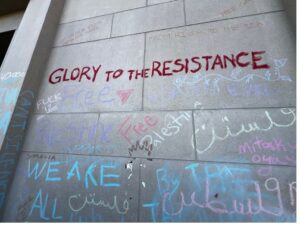
Graffiti reading “Glory To The Resistance” on the walls of Coffman Union on the campus of the University of Minnesota.
In the past week, pro-Palestinian graffiti on the Coffman Union praised “the resistance,” and signs held at a rally on campus read “Intifada is revolution, is armed struggle; glory to the resistance.”
The Arabic word Intifada translates to “uprising” or “shaking off, and has been used to describe periods of Palestinian protest against Israel, mainly in the form of violent terrorism. The First Intifada from 1987-1990 and the Second Intifada from 2000-05.
“If you know what the Intifadas were, could you imagine being a Jewish student hearing an agitated mob on your campus chant, “Globalize the intifada” – or as I hear it, “Globalize the killing of the Jews”? said Carlie Sachs, and University of Minnesota junior. “When the activists on campuses glorify October 7, I feel pained to see how proud they are that my people were massacred.”
Bias incidents on campus have more than doubled this school year from the 2022-23 year; there were 55 total last year, and 122 this year. Forty-two of those have been related to “Israel/antisemitism” and 16 tied to “Palestine/Islamaphobia,” according to the school. The U stats track with an increase nationwide. According to statistics compiled by Hillel International, antisemitic incidents against Jewish students on college campuses have increased 700% over the same period last year.
“So many Jewish students on this campus felt the need to fly under the radar over the last six months, often hiding any outward signs of their identity,” said U senior Ethan Fine. “Most just want to get home or go to class without disrupting any protests. But now we must confront this in the classroom as well.”
Fine was one of several students who gave examples of how the topic was handled in classes, including those having nothing to do with international relations. He said professors are canceling classes and encouraging students to go to protests.
Isabelle Pizzurro, a junior at the school, said her art history class was disrupted by the conversations in the class.
“I find this disheartening because it’s disrupting my education and my academic pursuits,” she said. “And it also singles me out as the only Jewish student in my classes, and I feel forced to take a position on this conflict that I may not be prepared for.”
Lyla Prass, a sophomore, said that she had an experience where a professor in a geography class decided to teach about the war, in the middle of a discussion on South America. The professor said that Israel was a genocidal apartheid state before the students broke up into small group discussions. Prass sat stunned, wearing the necklace of her name – in Hebrew that she got for her bat mitzvah.
“One of my peers next to me saw it and asked why I was killing her roommate’s cousins,” Prass said. “I never wanted to go back to that class again.”
She said that despite that, she continues to wear the necklace, but often keeps it tucked under her shirt rather than being visible.
“I wear it because I’m proud,” she said. “It’s part of who I am.”
Prass said it’s a scary time to be a student at the U right now.
“I feel like my education in that class was sacrificed and that’s not okay,” she said. “I want to learn, I want to want to go to my classes. I want to feel safe in my classes.”
Alex Stewart, Minnesota Hillel’s student president, said that this week in particular on campus has been “hard and disgusting and depressing and horrifying.”
“Walking on campus listening to people say that they want a global Intifada and death to Zionism is not okay,” she said. “These things I see on campus on the sidewalk and the walls of the union make me feel uneasy. I’m a college junior. I volunteer in my community. I have a job and I have finals next week. I should not have to also spend hours explaining to people that my safety in this moment is relative.”
Molly Seligman said the scariest thing about encountering the protests is that people don’t know what they don’t know, citing the lack of Holocaust education mandates in Minnesota and Wisconsin, which are the two largest feeder states to the school – although Minnesota passed one in the 2023 legislative session.
“Since I started school here every incident I’ve had of antisemitism has never been taken seriously. And that has only become worse this past year,” she said. “The fact that people are able to say this rhetoric that they don’t even understand and no one has taken the time to explain it yet is the part that makes it makes it scary to be a student here right now.”
Said Kirshbaum: “They are being used as propaganda for these terrorist organizations. It is incredibly sad to see them being used like this. I feel sad for everyone in this situation.”
In the education sessions around antisemitism, JCRC Communications and Community Affairs Director Sami Rahamim said he often talks about not knowing the intent of a particular speaker when it comes to what they’re saying. However, he, Kirshbaum, and the students made clear the effect the language was having.
“We’re super clear about the impact of those types of language has on our community. And we’ve been saying it over and over again: That this language is harmful. It is demonizing Israel and Jewish people who have a connection to Israel. That’s problematic and we’re not being listened to,” Rahamim said.
“I can understand wanting to protest the humanitarian crisis. It is deeply upsetting. And there are some students that know better, they know that what they’re advocating for is a pro-terror, pro-Hamas message. And then there are others who we have to give up some benefit of the doubt that they are, swept up, that they’ve watched three TikToks, and they think that they have suddenly understood, you know, all of Middle East history.”
Administration support lacking
Fine said that he took his concerns about the campus climate to administrators as far back as November, but was told that because there was no imminent threat to student safety, it couldn’t take action.
“Does this administration really have to wait for Jewish students to feel an immediate threat for safety for something to be done?” he said. “I’m concerned about the university not taking action until it was too late, whatever that may be. This lack of action at our university and others across the country is a failure of the higher education system. A failure not only to protect our students, but to educate them on such nuanced and complex ideas.”
Steve Hunegs, the executive director of the JCRC, said that he had met with Jeff Ettinger, the interim president of the University of Minnesota, in the fall.
“They heard as at that time. There’s been some movement. I think there should be more,” said Hunegs. “The university could speak with its very loud and clarion voice about these messages that the students are hearing, acknowledge the situation our Jewish students are facing. That would be critically important.”
Hunegs said that what the students are hearing from protesters is not acceptable discourse.
“The university, of course, acknowledged the importance of First Amendment rights on campus,” he said. “But simultaneously [there are] dangerous levels of incitement. Where will this go when you’re comparing Zionism to genocide? I can’t think of anything that’s more incendiary, than that. [It’s] putting people at risk.”
Ettinger, in an emailed letter to the campus community, said: “Protests on our campus and across the country this week highlight the diversity of lived experiences, identities, beliefs, and backgrounds within our communities.”
Fine said that he’s been disappointed in the university’s response in everything that’s happened on campus since October 7.
“[It’s] 203 days since October 7. I’m all more angry and more upset,” he said. “And as a student, it’s incredibly hard to go to class every day, to sit next to your peers, to sit and listen to faculty members, and even know that just the administration – all these people – you feel are against you. You feel not supported in your education. I just want to go to school.”
Stewart, the student president of Minnesota Hillel, said she’s fielding questions from prospective students about whether the campus is safe.
“I worry that recent media coverage that only focuses on the few 100 camped in front of the union, many of whom are not students, is making prospective Jewish students deem this place unsafe,” she said. “We are lucky that unlike other campuses, we have not seen anti-Jewish violence yet. However, I, like many students, fear that the extremist rhetoric could at any moment become real violence.”
The difficult conversations are difficult to have
The speakers were asked if they had attempted to discuss how the protests affected them. Rahamim said that the national leaders of Students for Justice Palestine make that impossible.
“There’s something called anti-normalization,” Rahamim said. “This is a doctrine…that instructs all of their campus chapters to refrain from any engagement with Israeli or Zionist mainstream Jewish voices.
“Because of this policy, SJP and their supporters isolate and place Jewish students outside the community of the good. Just write them off as so evil and untrustworthy. And that conversation isn’t even possible. It’s heartbreaking.”
Sachs talked about the bi-annual trip that Minnesota Hillel offers to five Jewish students and 25 non-Jewish student campus leaders to Israel and the Palestinian territories that she went on last year. She said for the past several years, recruiting has been a challenge.
“There have been letters sent from advisors to student groups saying you won’t be meeting with these people. We will not pass along your invitation for this experience,” Sachs said. “And it’s truly just a learning experience. That just shows how closed off they’ve been to conversations in the past.”
Kirshbaum, who in her role with Hillel also works with Jewish students at the other campuses in the state, said that students chose not to attend an interfaith Thanksgiving event because Hillel was there.
Calling out media
Sami Rahamim, the JCRC’s director of communications and community affairs, said that media outlets calling the protests “pro-peace” were missing the point.
“The ideas animating these campus protests are not about peace and reconciliation for Israelis and Palestinians,” Rahamim said. “Each of these protests begins with the infamous chant ‘From the river to the sea, Palestine will be free.’ This chant means the destruction of Israel. Why do we think that? Because Hamas tells us this is exactly what they mean. These protests are using the same language and imagery that we would see at a Hamas rally.”
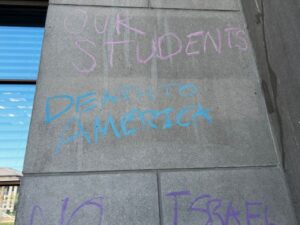
“Death To America” a recurring slogan of the Iranian regime, on the walls of Coffman Union at the University of Minnesota.
Rahamim played a video of Hamas officials using the slogan, and showed several images of offensive language, flyers and images from scenes around campus this week, and explained why they are problematic.
“Intifada is the same thing as October 7, just over a period of years, instead of all packed into one day,” he said. “This is what armed struggle looks like to the Palestinians who ruled Gaza.”
He explained that Hamas is an acronym, which, in translation, stands for Islamic Resistance Movement.
“This is a pro-terror message,” he said. “Why is the media not taking this seriously?”
There were also photos of people carrying the flag of the Popular Front for the Liberation of Palestine, a designated terrorist organization by the State Department since 1997, and, in chalk slogans “Zionists Fuck Off” and “Death To America.”
“The Supreme Leader of the Islamic Republic of Iran has voiced support for the student protests sweeping the country, so we see that symbiosis here as well, given that ‘death to America’ is a popular slogan amongst supporters of the Iranian regime,” he said. “The ideas animating these protests are built on an extreme maximalist vision to destroy Israel, the world’s only Jewish state.”
Ethan Roberts, the deputy executive director of JCRC, said calls for the divestment from Israel are essentially the same as calling for its destruction because the founder of the boycott, divestment and sanction movement has said that is the goal.
“One of the best ways to destroy Israel is to render it vulnerable and unable to protect itself,” he said. Roberts cited the drone and ballistic missile attack launched from Iran on Israel on April 13. “How do you think Israel is able to defend itself? It’s the companies that these protesters are targeting: American companies, which provide American jobs.
“This is a movement which does not believe Israel has a right to exist. If Israel doesn’t have a right to exist, then has the no right to defend itself. If it has no right to defend itself, when it does defend itself it’s obviously committing a genocide. So they want to want to make Israel toxic on campus so you can’t defend it. They also literally want to make sure that Israel can’t defend itself. So that they can carry out that message from Hamas from the river to the sea.”


















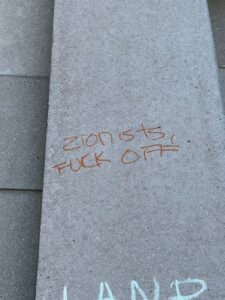
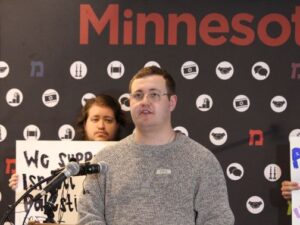
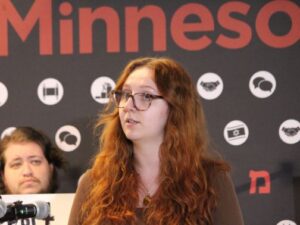
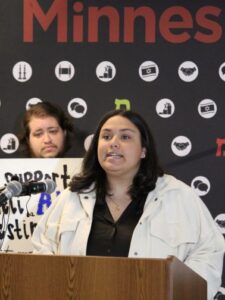



Thank you fir this great article and coverage of the press conference
Yes, I agree with Sheldon, very important and informative article. Keep it up!
The Administration being unsupportive is no surprise to me. It’s been that way at least since the 80s in my experience. At that time they would not even support a studen’ts request for an alterrnate midterm date when it was scheduled on Yom Kippur.
I am not Jewish. I am very angry and saddened about the antiSemitism expressed in these protests. As for the “from the river to the sea” chanters, unless these people are Native Americans, they should leave this hemisphere. Especially if they are of European descent, they should go back to Europe. If Israel is an occupation what do they think we white people have done here? Is it OK because this is more established? Longer lasting? It makes more sense to chant “from the Atlantic to the Pacific…” These people should stop projecting their own stuff onto the Jewish community. I’m so mad I will be making a donation to Jewfolk.